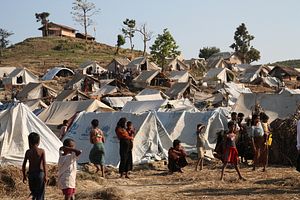A top official with the United Nations has warned Myanmar’s leader Aung San Suu Kyi that a crackdown on the Rohingya by the military and police amounted to “crimes against humanity” and that the situation in northern Rakhine states was far worse than anticipated.
Speaking with the BBC last week ahead of the release of her latest report, Yanghee Lee, the UN’s special rapporteur for human rights in Myanmar, said the Nobel laureate’s government had to bear some responsibility for the systemic abuse from within the security forces.
“I would say crimes against humanity. Definite crimes against humanity… by the Burmese, Myanmar military, the border guards or the police or security forces,” she said.
“At the end of the day it is the government, the civilian government, that has to answer and respond to these massive cases of horrific torture and very inhumane crimes they have committed against their own people.”
Her comments and report elicited a response that bore a familiar ring with the military junta, which governed this country for almost 50 years before Suu Kyi’s National League for Democracy (NLD) won office at historic elections in 2015.
Though that had raised hopes of an end to military oppression, tensions between the Muslim Rohingya and this country’s overwhelming Buddhist population persisted and led to a military crackdown last October resulting in 70,000 Rohingya fleeing into neighboring Bangladesh.
Reports of abduction and rape of young girls, children killed, the beating and shooting of civilians who were forced out of their homes have been well-documented by the media and non-governmental organizations (NGOs), but Suu Kyi and her NLD have effectively told the outside world to butt out.
NLD spokesman Win Htein said the UN’s claims were an exaggeration, adding the UN had sometimes got it wrong.
“It’s an internal affair – it’s not an international affair,” he told the BBC. “As a new government we’re just trying to achieve to [be] a modern country. We have thousands of problems … we don’t believe it’s crimes against humanity.”
His denials follow the release of an interim report in January from a commission set up by the Myanmar government and led by former general, Myint Swe, that found there was not enough evidence to support widespread allegations of rape.
That earned a rebuke from the New York-based Human Rights Watch (HRW), which slammed the report as a “classic example of pre-baked political conclusions to assert the situation is not so bad, designed to push back against international community pressure.”
Mistreatment and discrimination of the Rohingya has been widespread. In 2012, communal violence left some 100,000 people displaced. The latest attacks, coupled with the NLD’s position as the government rather than its longstanding role as an opposition, has led to fierce criticism of Suu Kyi for being complicit in the abuses against the Rohingya.
At least a dozen Nobel laureates have written to the UN Security Council demanding an end to the violence, saying it amounted to “ethnic cleansing and crimes against humanity.”
Activists, and in particular Muslim countries like Indonesia, Pakistan and Malaysia, have also condemned the international response from groups like the UN as being too little too late.
The situation in Rakhine has even earned comparisons with the July 1995 massacre in Srebrenica, when more than 8,000 Bosnian Muslims under UN protection were slain.
The BBC, along with dozens of media organizations, have sought further comments from Suu Kyi on this issue. Clarity is needed on many levels as the allegations warrant investigation by the International Criminal Court (ICC) in The Hague.
Suu Kyi’s government has also said no evidence of a genocide has been found.
Luke Hunt can be followed on Twitter @lukeanthonyhunt

































